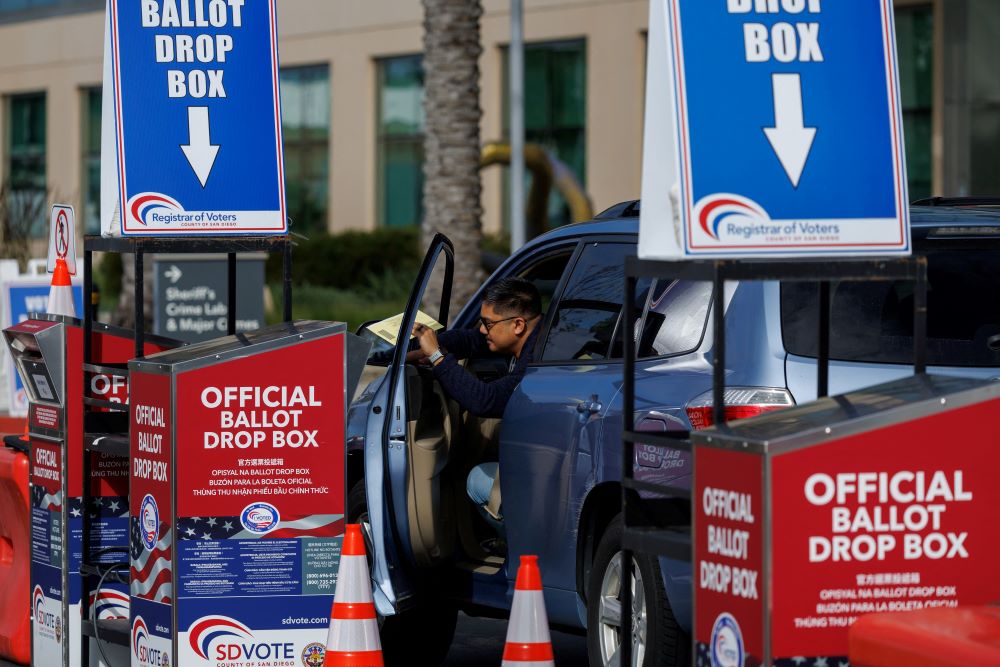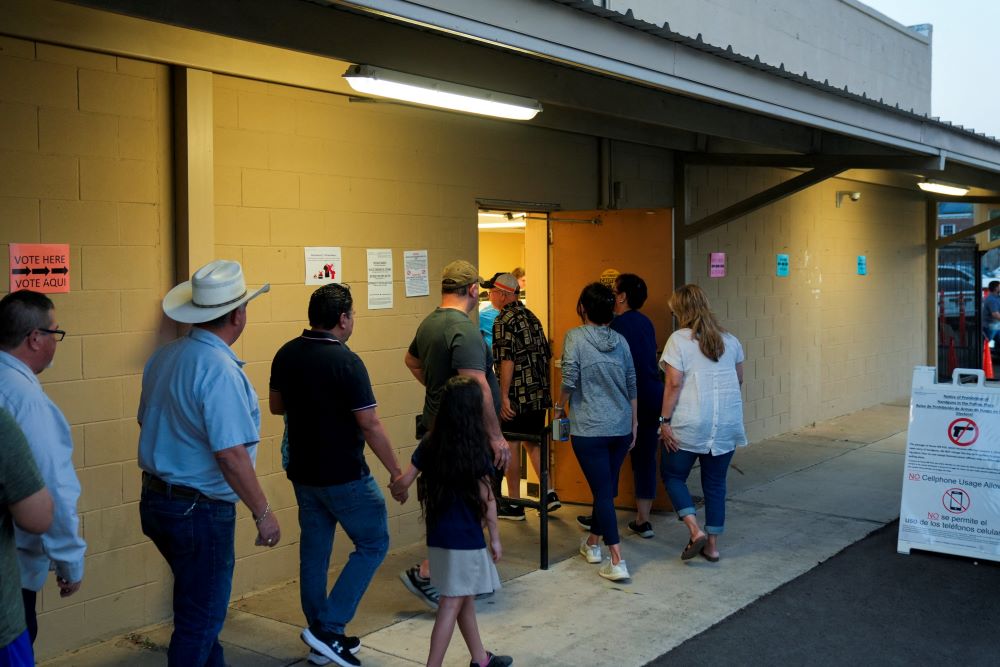
A voter drops a ballot paper into a drop box from his vehicle in San Diego during the Super Tuesday primary election March 5. (OSV News/Reuters/Mike Blake)
As the election cycle heats up, what role should the leaders of the Catholic Church play in the political life of the nation? This question is complicated, and will require several columns in the weeks ahead, but today, let's start by focusing on the role of bishops and on some basic points of orientation.
Usually when we think of Catholic social teaching, we start with Gaudium et spes, the Second Vatican Council's Pastoral Constitution on the Church in the Modern World and the longline of papal encyclicals dating to Pope Leo XIII's seminal Rerum Novarum. Today, mindful of the acute polarization in our nation's politics, I would like to suggest a different starting point: Lumen gentium, Vatican II's Dogmatic Constitution on the Church.
The opening words of that document make a critical point about the role of the church in the world:
Christ is the Light of nations. Because this is so, this Sacred Synod gathered together in the Holy Spirit eagerly desires, by proclaiming the Gospel to every creature, to bring the light of Christ to all men, a light brightly visible on the countenance of the Church. Since the Church is in Christ like a sacrament or as a sign and instrument both of a very closely knit union with God and of the unity of the whole human race, it desires now to unfold more fully to the faithful of the Church and to the whole world its own inner nature and universal mission. This it intends to do following faithfully the teaching of previous councils. The present-day conditions of the world add greater urgency to this work of the Church so that all men, joined more closely today by various social, technical and cultural ties, might also attain fuller unity in Christ. (Emphasis mine.)
We cannot be "a sign and instrument … of the unity of the whole human race" if we are feeding the polarization that has too often crept into the life of the church as well.
In this regard, I would commend every bishop read (hopefully reread) Boston College professor Cathleen Kaveny's important book Prophecy Without Contempt: Religious Discourse in the Public Square, which I reviewed in two parts, here and here. Jeremiads were a source of social unity in colonial times when there was widespread agreement about people's covenantal obligations. Today, when there is no such agreement, jeremiads only serve polarization.
We cannot be "a sign and instrument … of the unity of the whole human race" if we are feeding the polarization that has too often crept into the life of the church as well.
Lumen gentium states that it aimed at "faithfully following the teaching of previous councils" and it did. The task of bishops today is to faithfully follow the teaching of the Second Vatican Council and of the magisterium, and to gently correct misinterpretations of that teaching. For example, some people who wish to diminish the binding nature of church teaching on complex issues like the environment argue that addressing climate change requires prudential judgments about which people of good faith can disagree. True enough, but prudential judgment is not a get-out-of-jail-free card either. There are practical applications of church teaching that contradict that teaching in foundational ways. Bishops are well-advised to discuss the role of conscience formation and prudential judgment when they turn their attention to public policy issues, but to do so responsibly.
Lumen gentium also roots its ecclesiology, and therefore the witness of the church to the world, in the life, death and resurrection of Jesus Christ. He is the light of the world. At the Laudato Si' conference I helped organize in February, one of the smartest things that was said was, "We need to sound like Catholics, not like environmentalists." Bishops should certainly rely on expert advice on a host of issues, but when they speak, the only authority they possess is as a successor of the apostles. That is no small thing.

People stand in a line to vote shortly before the polls close in Edinburg, Texas, during the Super Tuesday primary election March 5. (OSV News/Reuters/Cheney Orr)
I have often speculated what would happen if you gave each bishop a blank piece of paper and a pen, and invited them to link whatever they just said about public affairs with the empty tomb of Jesus. I suppose most of us would fail that test. But bishops are well-advised to ask this question of themselves before speaking. If they can't do it, let someone else say it.
Relatedly, in the ecclesiology of our Catholic Church, the visible focus of ecclesial unity is Peter. Bishops of the Catholic Church govern cum Petro et sub Petro. All bishops should ask themselves: Is what I am saying in sync with what the Holy Father says? And, am I saying it in the pastoral manner in which he speaks? This is not only a matter of ecclesiology, but of effective communication as well. More Catholics know the name of the pope than the name of their bishop, even though both are recited in the canon of every Mass. But if a bishop doesn't sound like the pope, or contradicts him, he is polarizing the church itself and will leave the people of God scratching their heads.
Advertisement
Finally, bishops need to think about how their entire pastoral work serves to build up the unity of the church and, just so, make the church an instrument of the unity. Here, I would point to something St. Pope Paul VI wrote in Evangelii nuntiandi: "Modern man listens more willingly to witnesses than to teachers, and if he does listen to teachers, it is because they are witnesses." Bishops do more than issue statements. Their role as pastors of a local church allows them to harness the church's witness of service to the poor, to migrants, to the unborn and to creation as part of their pastoral teaching on the common good of public life.
Our nation is more divided than at any time since the Civil War and the church has a duty to help heal the wounds from which those divisions spring, as well as the divisions themselves. In calibrating what their public teaching and witness should look like this year, however, their first question must be: Does what I intend to say or do help unite the Body of Christ? And if the answer is no, it is better to say nothing at all.








